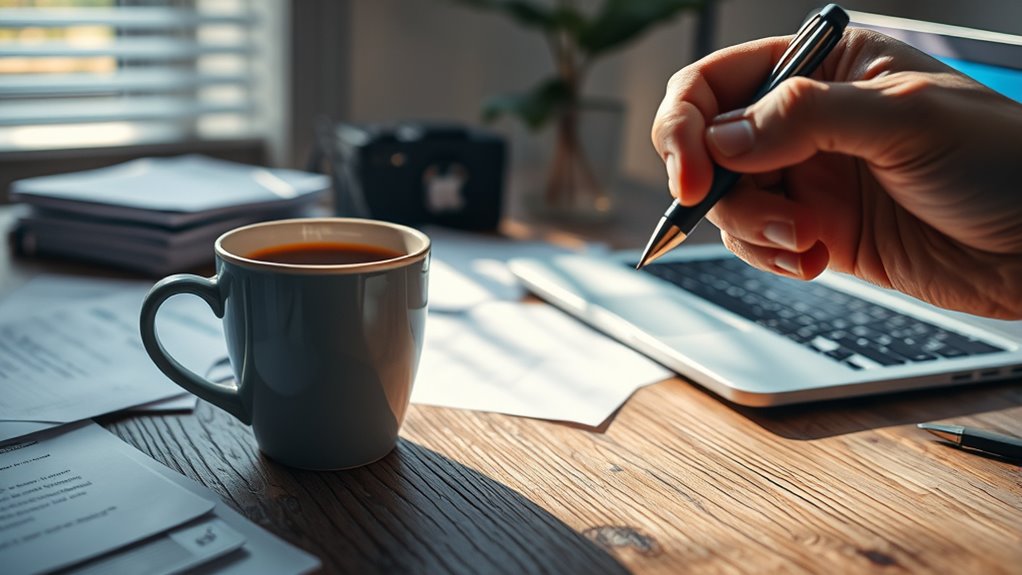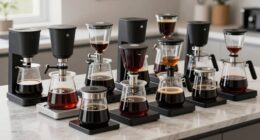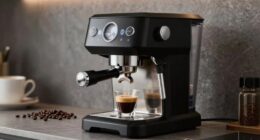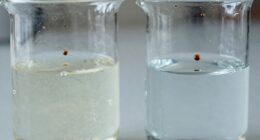Coffee might give you a quick boost of alertness under pressure, but relying on caffeine can actually hinder your stress management. It can increase anxiety, cause jitters, and mask underlying stress, making it harder to handle pressure naturally. Dependence on coffee can also lead to withdrawal symptoms that add to your stress. For better resilience and long-term calm, it’s helpful to explore healthier strategies. Keep going to discover how to balance caffeine and stress effectively.
Key Takeaways
- Caffeine can boost alertness temporarily but may increase anxiety and nervousness during stressful situations.
- Heavy coffee intake can mask stress symptoms, making it harder to develop healthy coping strategies.
- Dependence on caffeine may lead to withdrawal symptoms, which can elevate stress levels when not consumed.
- Moderate caffeine consumption, combined with stress management techniques, can help improve focus without worsening stress.
- Over-reliance on coffee might hinder long-term stress resilience and natural stress regulation abilities.

Many people rely on coffee to kickstart their day, but did you know that it can also influence your stress levels? If you find yourself reaching for that cup each morning, you might be unknowingly affecting how you handle pressure. Caffeine is a stimulant that temporarily boosts alertness, but it can also lead to caffeine dependence if you’re not careful. When you rely heavily on coffee to get through stressful days, it sometimes becomes a crutch that masks underlying stress rather than addressing it. This reliance can create a cycle where you feel anxious or jittery without your caffeine fix, making stress harder to manage naturally.
Your stress coping mechanisms are essential in how caffeine impacts you. If you tend to use coffee as a way to push through fatigue or to stay alert during tense situations, it might seem helpful initially. However, over time, caffeine dependence can develop, which means your body starts craving it to maintain normal functioning. This dependence might cause withdrawal symptoms like headaches, irritability, or fatigue when you don’t get your usual dose, further increasing your stress levels. Instead of helping you cope, excessive caffeine intake can make managing stress more challenging because it masks symptoms rather than resolving underlying issues.
Caffeine dependence can mask stress symptoms, making it harder to address underlying issues effectively.
Moreover, caffeine’s effect on your nervous system can exacerbate feelings of anxiety, especially during stressful periods. It triggers the release of adrenaline, which heightens alertness but also increases heart rate and feelings of nervousness. When you’re already under pressure, this heightened state can feel overwhelming, leading to a cycle where stress worsens, and you turn to more caffeine for relief. This pattern can become problematic, making it harder to develop healthy stress management techniques.
To better handle stress, consider moderating your coffee intake and exploring alternative coping strategies. Techniques like deep breathing, exercise, or mindfulness can help you build resilience against stress without relying solely on caffeine. Recognizing the signs of caffeine dependence is key; if you notice yourself feeling anxious or experiencing withdrawal symptoms, it might be time to cut back. Additionally, knowing that wood-burning stoves provide effective radiant heat and can be a cozy, sustainable alternative for home heating, can help reduce reliance on energy sources that may contribute to overall stress about utility bills and environmental impact. Remember, coffee can be part of your routine, but it shouldn’t replace genuine stress management practices. Building healthy habits and balancing your caffeine consumption with other stress-relief methods will give you a more sustainable way to stay calm and focused under pressure.
Frequently Asked Questions
Can Decaffeinated Coffee Reduce Stress Better Than Caffeinated?
You might wonder if decaf benefits your stress levels more than caffeinated coffee. While decaf contains less caffeine, it can still help reduce stress by avoiding caffeine withdrawal symptoms that cause anxiety and jitters. Choosing decaf allows you to enjoy the taste without the stimulant’s effects, helping you stay calm and focused. If caffeine triggers stress or withdrawal symptoms, opting for decaf might be the better choice.
How Does Coffee Affect Sleep Quality During Stressful Periods?
During stressful periods, coffee can cause sleep disruption because caffeine raises your cortisol levels, making it harder to fall asleep and stay asleep. If you consume coffee late in the day, you’re likely to experience restless nights. You should be mindful of your intake, especially when stress is high, to protect your sleep quality. Limiting caffeine after mid-afternoon helps maintain better sleep and reduces stress-related sleep issues.
Are Certain Types of Coffee More Effective for Stress Relief?
Think of coffee blends and brewing methods as keys to opening calm in chaos. You might find that lighter roasts or herbal-infused blends help you feel more relaxed, while darker roasts with robust flavors energize you. Brewing methods like pour-over or French press can influence caffeine’s impact, making certain types more effective for stress relief. Experiment to discover which coffee styles soothe your nerves best during tense moments.
What Are the Long-Term Mental Health Effects of Regular Coffee Consumption?
You might wonder about the long-term mental health effects of regular coffee intake. Consuming caffeine daily can boost alertness temporarily, but over time, it may lead to dependence, affecting your mental stability. Caffeine dependency can cause anxiety, mood swings, or sleep issues, which might worsen mental health if not managed. To protect your well-being, consider moderating your intake and paying attention to how caffeine influences your mood and stress levels.
Does Timing of Coffee Intake Influence Its Impact on Stress Levels?
When considering coffee timing, caffeine scheduling plays a vital role in managing stress levels. If you drink coffee early in the day, it can boost your alertness without adding to afternoon anxiety. However, consuming caffeine late can interfere with sleep, heightening stress. So, by timing your coffee intake wisely, you help control stress, ensuring caffeine’s energizing benefits without the negative effects of poor sleep or heightened anxiety.
Conclusion
So, next time you’re feeling overwhelmed, remember that a single cup of coffee might do more than just wake you up. Studies show that about 90% of Americans consume caffeine daily, often to boost alertness. While it can help you focus temporarily, too much might increase your stress levels. Find your balance—enjoy coffee in moderation to stay sharp without adding to your pressure. Your mindful choice can make all the difference under pressure.









